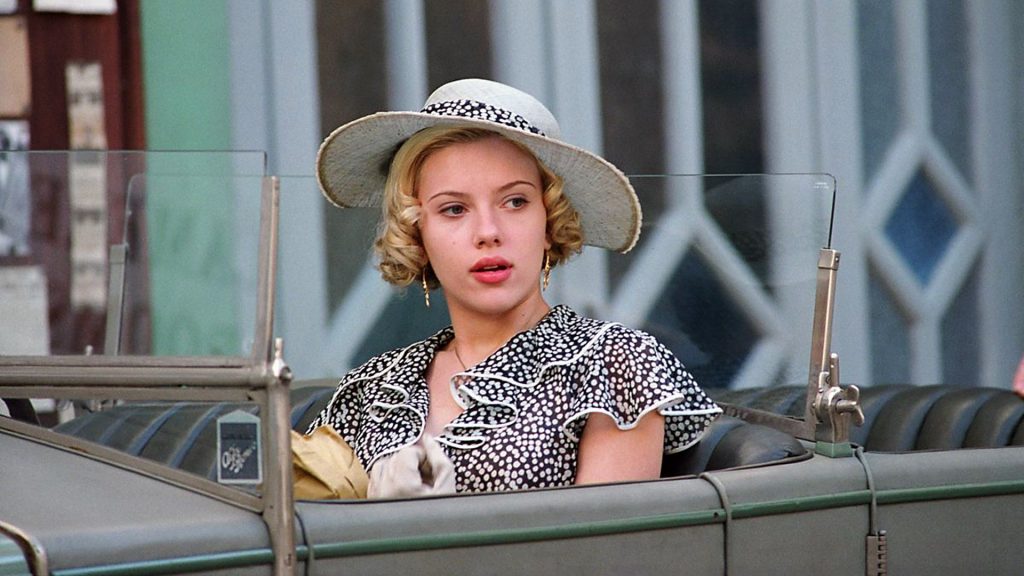A Good Woman (2004)

A loose interpretation of the Oscar Wilde play, “Lady Windermere’s Fan”, A Good Woman changes the time period to the 1930s and the setting to the Amalfi coast of Italy, as well as incorporating quotes from other Wilde works. Like most Wilde plays, it has been made into film and for television numerous times, although this version isn’t a strict adaptation, causing the name to be changed, rightfully, to use a part of the play’s secondary title, “A Play About a Good Woman”.
Helen Hunt stars as the scheming seductress of wealthy, married men, Mrs. Stella Erlynne, who has traveled to Italy after leaving hastily from her last conquest. Also arriving to the lush spot are newlywed couple Robert (Umbers) and Meg Windermere (Johansson), who have a strong marriage built upon having no secrets and telling no lies to each other. However, doubts begin to emerge as to Robert’s fidelity, as he engages in suspicious activities, such as leaving unexpectedly and writing checks made out to the mysterious Mrs. Erlynne. Meanwhile, Mrs. Erlynne and Meg have suitors of their own in the form of the wealthy Tuppy (Wilkinson) and roguish playboy Lord Darlington (Moore), respectively.
A Good Woman delivers pretty much what you’d expect from a period piece, including elegant costumes, lavish sets, and sumptuous cinematography. It also delivers just what you’d expect from a Wilde adaptation, with humorous quips, telling observances, and articulate musings coming from the mouths of nearly every character in the cast. I call these sorts of movies “cup of tea” films — it’s either your cup of tea or it isn’t. Those with refined tastes, or those that like to feel refined, should enjoy it, while those that would prefer modern-day tales without a bunch of snobby talking heads will find it a snooze-fest.
I actually enjoy these sorts of films, as the writing is generally of high caliber, and the exotic locales and vibrant scenery make for an enjoyable cinematic experience, even if the main story is a bit dull. It’s hard to go wrong with Oscar Wilde’s writing, as there is just as much joy, if not more, in hearing the many witticisms, spoken mostly in asides, than in following the plot at large. If you’re familiar with Wilde, you’ll probably expect a few misunderstandings and odd contrivances to dominate most of the story, which by today’s standards aren’t very fresh, but with Wilde, the pleasure derives from the journey, not the destination.
I’ve never actually seen “Lady Windermere’s Fan” performed, on stage or on film, but I’ll guess that, given its numerous adaptations over the years, that it is generally delivered in a much funnier and respectable fashion than it is in A Good Woman. If there is one gripe I might have, it’s in the casting (I should say miscasting) of Helen Hunt as Mrs. Erlynee, as she exhibits little of the traits of a sassy seducer that the part requires to make it believable that a man would risk his wealth and relationship to be with her. Much of this comes from the wholesome “girl next door” personality of Hunt herself, as it is hard to buy her in the role of home-wrecking harlot when every look and mannerism screams out “wife material”.
As alluded to earlier, lovers of costume period pieces will enjoy this more than most, while fans of Wilde will probably find it an interesting rendering of his play, even if it isn’t of the quality that suggests Academy Award nominations are in order. Wilde’s eminently quotable quips are the main assets, although Scarlett Johansonn’s involvement, and a nice performance, should draw in a few of her fans, while Tom Wilkinson delivers in another wonderful supporting role. It’s not for everyone, but if you’ve read this far and it sounds like your “cup of tea”, by all means, watch and enjoy.
Qwipster’s rating: B+
MPAA Rated: PG for sensuality and language
Running Time: 93 min.
Cast: Helen Hunt, Scarlett Johansson, Marc Umbers, Stephen Campbell Moore, Tom Wilkinson, Milena Vukotic, Roger Hammond, John Standing
Director: Mike Barker
Screenplay: Howard Himelstein (based on the play, “Lady Windermere’s Fan”, by Oscar Wilde)
